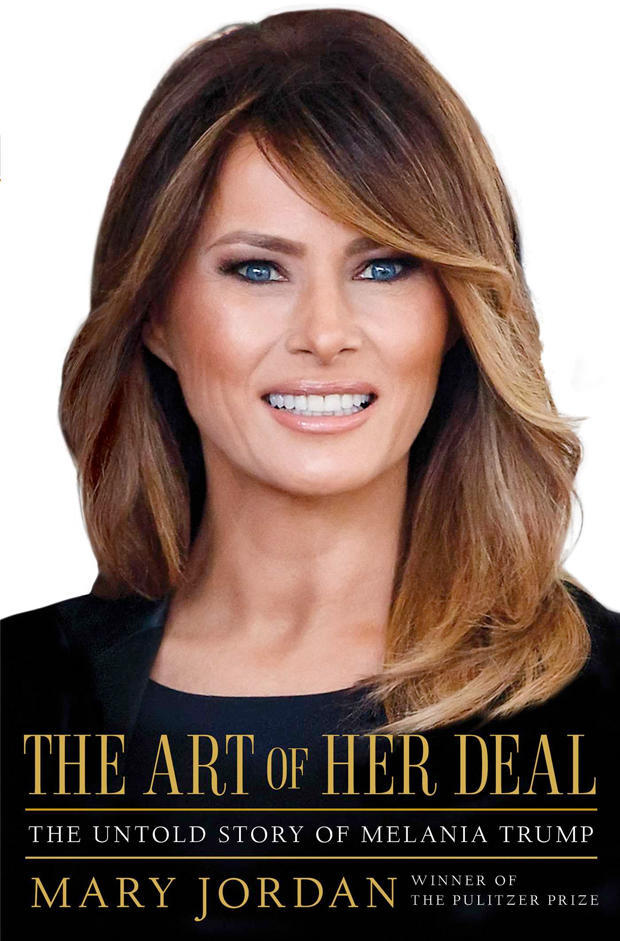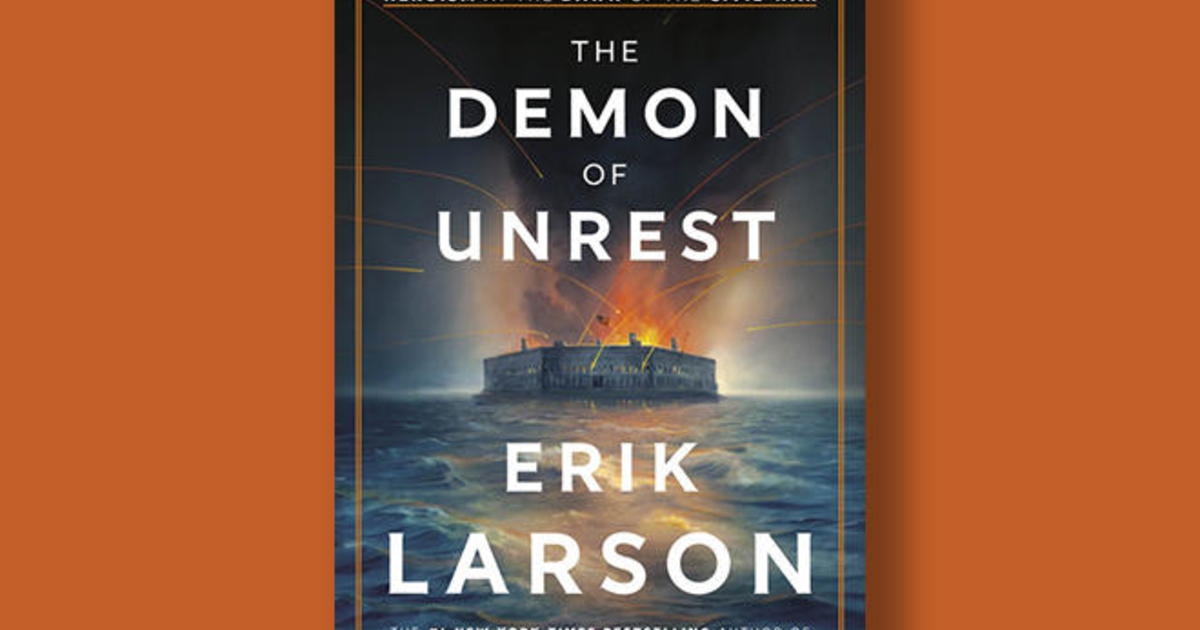Book excerpt: Melania Trump and "The Art of Her Deal"
In her new book, "The Art of Her Deal: The Untold Story of Melania Trump" (published by Simon & Schuster, a division of ViacomCBS), Pulitzer Prize-winning Washington Post reporter Mary Jordan examines the private life and ambitions of the first lady, whose influence in the campaign and administration of her husband is not well-known to the public – and that may be how Melania Trump likes it.
In the excerpt below, Jordan recounts Melania's reaction to the infamous "Access Hollywood" tape (in which her husband is caught on a hot mic lewdly bragging of assaulting women), and how she steered the campaign around the video that could have sunk the Republican nominee's presidential aspirations.
Read the excerpt below (including a sample from the audio book read by the author), and don't miss Tracy Smith's interview with Mary Jordan on "CBS Sunday Morning" June 14!
Prologue
"I have an opinion"
Donald Trump and his top advisors were gathered around campaign spokeswoman Hope Hicks as she clicked PLAY to start a video on her laptop. It was late afternoon on Friday, October 7, 2016. In one month, voters would choose between Trump and his Democratic presidential rival, Hillary Clinton. Trump and his aides had been strategizing before a crucial Sunday night debate in a conference room on the twenty-fifth floor of Trump Tower. But now they shifted into crisis mode and all eyes were riveted on the video.
It showed Trump and Access Hollywood host Billy Bush, nephew of the forty-first president, engaged in a lewd exchange on an NBC Studios lot. Nothing about the tape was flattering. After a voice offscreen said, "She's still very beautiful," Trump was heard boasting, "I moved on her, actually. You know, she was down on Palm Beach. I moved on her, and I failed. I'll admit it." After someone off camera says, "Whoa," Trump replied, "I did try and f**k her. She was married."
"That's huge news," came the reply. Then Trump again, "I moved on her very heavily. In fact, I took her out furniture shopping. She wanted to get some furniture. I said, 'I'll show you where they have some nice furniture.' I took her out furniture – I moved on her like a b***h. But I couldn't get there. And she was married. Then all of a sudden I see her, she's now got the big phony t**s and everything. She's totally changed her look."
There was some back-and-forth with Billy Bush, including Bush saying, "Yes! The Donald has scored. Whoa, my man!" Then Trump said, "Yeah, that's her. With the gold. I better use some Tic Tacs just in case I start kissing her. You know, I'm automatically attracted to beautiful – I just start kissing them. It's like a magnet. Just kiss. I don't even wait. And when you're a star, they let you do it. You can do anything." Bush replied, "Whatever you want," to which Trump spoke the now infamous line, "Grab 'em by the p***y. You can do anything."
The room was stunned into silence.
New Jersey governor Chris Christie zeroed in on the video's date stamp: September 2005. Eleven years ago. That meant that Trump was not some young, single guy when he said these words. He was fifty-nine years old and had recently married his third wife, Melania, then nearly three months pregnant with their son, Barron.
Trump was quiet. Christie knew what Trump was dreading: facing Melania. "She was the elephant not in the room," Christie said. Trump was so embarrassed that, as one person in the room recalled, "He turned red; red was coming up his neck to his ears. I think he understood early on that it was going to create ramifications for him at home, too."
The video went viral, breaking online viewership records at the Washington Post. But Team Trump was focused on one person sitting more than thirty floors above them in the penthouse. They could spin and divert attention – strategist Steve Bannon, Trump son-in-law Jared Kushner, and others were already formulating ideas for how to do that – but if Melania walked out, the campaign was all but over. If she said she couldn't tolerate her husband's behavior, why should female voters?
"Everybody was saying, 'You should go upstairs and see Melania. Why don't you go upstairs now and see Melania?' And he was not rushing to go up there," Christie remembered. "I said to him, 'It ain't going to get any easier. The longer you wait, it's not going to get any easier.'" Another person in the room said, "That night he seemed frightened to go face his wife." It took Trump two hours to finally step into the elevator.
Melania does not yell or throw lamps. She shows her fury quietly and deliberately. "Now you could lose," she said to him, according to someone who heard the account of what she told Trump. "You could have blown this for us." Melania had been one of the few around Trump who had been telling him he would win. Others thought he would lose but believed the campaign would be a win for the Trump brand: maybe a new Trump TV network, probably more Trump hotels, and certainly more Trump merchandise. But Melania was a believer. Now she told him his mouth had jeopardized their chance at the White House. Trump apologized. He said he didn't mean any of that; it was just his shtick. She left him to stew and retreated to her own bedroom.
Several of Trump's aides said that Melania needed to be seen in public with him immediately. They wanted a joint TV appearance, where she would sit beside him and say that the words on the tape in no way reflected the man she admired. Some said that Ivanka, Trump's elder daughter, should join them, too, and that both women should look into the camera and say how much Trump respects women. Trump aides played the tape of Hillary Clinton joining her husband on a 60 Minutes interview when allegations of his infidelity arose during the 1992 campaign. They watched to see how close Hillary sat to her husband, what phrases she used to stand by her man. When Melania eventually joined the strategy session, she had a one-word reply: "No." She said she would decide on her own what to do. And right now she was not going on television with her husband.
As Melania watched the nonstop TV coverage, she was particularly upset by how she was characterized. People said that they felt sorry for her. Poor Melania. That irked her. She was not fragile. She was strong and in control. "I am putting out a statement," she said, according to Christie. "I am not going to sit here and pretend that I don't have an opinion. I have an opinion and people need to know my opinion." The next day, October 8, Melania, campaign manager Kellyanne Conway, and others gathered in the penthouse kitchen, where Melania told them what she wanted to say.
Trump didn't try to stop her. He just asked to read her statement before it went out. "He understood that his conduct had put her in an embarrassing position and that this was not a woman who was just going to sit there and take it," Christie said.
Shortly before 3:00 p.m. that Saturday, Trump read Melania's response. "The words my husband used are unacceptable and offensive to me. This does not represent the man that I know. He has the heart and mind of a leader. I hope people will accept his apology, as I have, and focus on the important issues facing our nation and the world." Trump, sitting in the living room with his advisers, read it quietly and passed it back to an aide, who returned to Melania in the kitchen.
"This could have been a lot worse," Trump said, relieved.
Soon he was back, tweeting: "I WILL NEVER DROP OUT OF THE RACE."
Melania's handling of the Access Hollywood tape was telling. She may not like what is said about her or her husband, but she has an exceptional capacity to shrug it off, or at least press her lips together and say nothing. She never feels the need to explain herself, her marriage, or even what drove her to wear a jacket with "I REALLY DON'T CARE. DO U?" scrawled on its back. Her press office doesn't answer questions about where she is on many days. She has always been independent, highly focused, and acutely aware of her own power and when to deploy it. Among her small staff, she inspires loyalty and an instinct to protect her. Only she and those close to the president truly know the strength of her influence behind the scenes, but it has been felt in her longstanding support for his political ambitions, how he campaigned in 2016, his choice of a running mate, and in many personnel and policy decisions in the White House. Those who dismiss her as nothing more than an elegant accessory do not understand her or her influence. She works at remaining mysterious. In her own way, she is as complex and complicated as her husband. She is also much more like him than it appears.
"This is not some wallflower; this is somebody who is so self-confident and so self-assured," Christie said. He added that people who speculate that Melania doesn't love Trump are "misreading the signs" and simply seeing what they want to see. She has not liked everything her husband has said, and definitely has not liked everything he has done, but she has always been fully behind him. "She understands that she's married to a very big personality, and someone who is impulsive at times – in his personal life as well as in his policies, and she gets that," said someone who has known the couple for years. She is willing to overlook a lot because though she craves a quiet life at times, the girl from a small central European town, who couldn't wait to get to New York City, also delights in being where the action is. "Melania is so underestimated."
Trump struggled with his own response to the tape, and around midnight Friday, he issued a videotaped apology. "I said it, I was wrong, and I apologize." But after those rare words of contrition, he pivoted back to his more familiar attack mode: "I've said some foolish things. But there's a big difference between the words and actions of other people. Bill Clinton has actually abused women, and Hillary has bullied, attacked, shamed, and intimidated his victims."
Sunday night at the debate, he said that he had apologized to his family for what he called "locker-room talk." Melania shook Bill Clinton's hand before the debate. Then she took her seat. Also seated in the audience were guests Trump had invited to divert attention from his history with women: three women who had previously accused Bill Clinton of sexual misconduct, and a fourth whose alleged rapist Hillary had been assigned to defend as a young attorney in the 1970s. Trump attacked Hillary all night, while Melania said nothing, but made headlines with an $1,100 fuchsia blouse with a bow tied at her neck, a style called a "pussy bow." "Have we underestimated the wit of this former nude GQ cover star?" The Telegraph of London asked, referring to one of her most famous modeling shoots.
"She makes good choices," said Marina Masowietsky, a modeling agent who first met Melania when she was twenty-two. "She is quiet and looks around. Then she makes a move." Masowietsky said that Melania has not shied from risk: first leaving a prestigious architecture program to try modeling, and then leaving the comfort of Europe for the promise of the United States: "She took a chance. She got on the plane and went to New York."
After the Access Hollywood video broke, every TV host in America wanted to interview Melania. It was one month to the election. Polls were showing that women who had been on the fence about Trump were moving toward Clinton. Melania knew she had more to gain by standing by her husband than walking away. Several people in her orbit said she was aware of her power in that moment and planned her next move carefully. "She's very deliberative," agreed Corey Lewandowski, Trump's first campaign manager. "When she goes and does something, it is well executed, it is well thought-out."
For her first interview, Melania chose Anderson Cooper, son of the famous socialite and designer Gloria Vanderbilt, also no stranger to family drama, and the franchise face of CNN. He offered a lengthy sit-down to hear Melania's side of the story. What she could not have known is that Cooper would drop his usual more hard-hitting style. He treated Melania gently. "This has obviously been a difficult time," Cooper said, opening the interview in Melania's opulent gilded sanctuary in the Trump Tower penthouse. "How are you holding up? How are you doing?"
Sitting very straight, wearing a white dress with a high collar, her hands folded on her lap, Melania looked directly at him. "I'm great. I'm very strong. I'm very confident. And I live my life." She would not describe the conversation with her husband, saying, "When we talk in private, I will keep it private." She said that her husband had apologized to her – and that it should be good enough for everybody else. "I accept his apology. I hope the American people will accept it [as] well."
She added, "My husband is real. He's raw. He tells it as it is. He's kind. He's a gentleman." At another point, she added, "People think and talk about me, the – like, 'Oh, Melania, oh, poor Melania.' Don't feel sorry for me. Don't feel sorry for me. I can handle everything." She said that she had seen people on television who "think they are celebrities" criticizing her and suggesting others should feel sorry for her. "I would suggest to them to look themselves in the mirror and to look at their actions and to take care of their own families," she said, adding she had a "great marriage and a strong relationship." She said of her husband, "He said many times ... that I'm rock for whole family." (The Slovenian language does not use articles such as "a" and "the," and Melania and others who learn English as a second language sometimes drop those words.)
But she also emphasized that she was not Donald Trump, and that she made her own decisions. "We are – we are two independent people, thinking on their own, and have a very open conversation ... I don't listen [to] anybody about what to do, what to say, when to say it, when to do interviews," she said.
Her choice in that moment was to back up her husband.
She painted Trump as the victim of a conspiracy of "left-wing media" and attacks "organized from the opposition," including the Clintons. She dismissed his statements as "boy talk" and said he had been "egged on" by Billy Bush to "say dirty and bad stuff." She echoed what the Trump campaign was stressing: Donald Trump is a great promoter of women. "He supports everybody. He supports women. He encourages them to go to the highest level, to achieve their dreams, to – employs many, many women."
Then she tried to lighten the conversation by saying, "I have two boys at home. I have my young son and I have my husband." Cooper also asked about women who have come forward and made allegations of sexual misconduct against Trump. "Some of them go back more than thirty years. He's said they're lying. Do you believe him?" Cooper asked.
Melania replied, "I believe my husband. I believe my husband. This was all organized from the opposition and with the details that they go – did they ever – did they ever check the background of these women? They don't have any facts."
Not only was she defending her husband, but she was attacking the credibility of the women who had accused him. And then she surprised many by saying she had seen women pursue her husband. "I see many, many women coming to him and giving phone numbers and, you know, want to work for him or inappropriate stuff from women. And they know he's married."
"You've seen that?" Cooper said.
"Oh, yes, of course. It was in front of me."
"In front of you?"
"In front of me. And I said, like, why you need to give your number to my husband?"
She had clearly followed the news coverage of the tape. "It was hour after hour. I watched TV, was hour after hour bashing him because they want to influence the American people how to vote. And they're influencing in the wrong way."
Melania's interview with Cooper was a powerful display of loyalty but she ended with a declaration of independence: "He will do what he wants to do on the end, as I will do what I want to do." As Melania was defending her husband, Trump's personal attorney, Michael Cohen, was preparing to pay $130,000 to Stephanie Clifford, an adult-film star whose professional name is Stormy Daniels, to not go public with her story about the night she claimed to have had sex with Trump. In sworn testimony before Congress in February 2019, Cohen said Trump "asked me to pay off an adult-film star with whom he had an affair, and to lie to his wife about it, which I did. Lying to the First Lady is one of my biggest regrets. She is a kind, good person. I respect her greatly – and she did not deserve that."
Five days before the election, Melania made a rare solo campaign appearance in the swing state of Pennsylvania. Standing in the audience, I watched as she spoke to a packed auditorium outside of Philadelphia. Melania promised the crowd, particularly the women, that her husband cared about them, and "respects women and provides them with equal opportunities." She said, "He will make a fantastic president."
I spoke to the Republican women who stood beside me in the audience. Not all were completely persuaded, but many said Melania offered a convincing case for her husband. "This beautiful woman could have a lot of rich guys – he can't be that bad," one attendee said.
On election night, Trump won Pennsylvania by less than 1 percent, ensuring that he and Melania would be moving to the White House, not Hillary and Bill Clinton.
From "The Art of Her Deal: The Untold Story of Melania Trump" by Mary Jordan, published by Simon & Schuster. Copyright © 2020 by Mary Jordan. Reprinted by permission.
For more info:
- "The Art of Her Deal: The Untold Story of Melania Trump" by Mary Jordan (Simon & Schuster), in Hardcover, eBook and Audio formats, available via Amazon
- Mary Jordan, The Washington Post
- Follow Mary Jordan on Twitter




